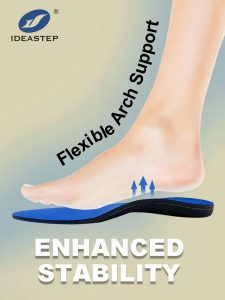
Over-the-counter insoles can be both a waste or worth it, depending on the individual’s needs and circumstances. Here are some considerations:
1. Support for Common Foot Problems
Over-the-counter insoles can provide relief and support for common foot problems such as plantar fasciitis, flat feet, arch pain, and heel spurs. If you’re experiencing these issues and find that , then they can be worth it.
2. General Comfort
Insoles can enhance the comfort of your shoes by providing additional cushioning and shock absorption. If you spend long hours on your feet or engage in activities that put stress on your feet, such as running or hiking. It might offer extra comfort.
3. Cost
Over-the-counter insoles are generally more affordable than custom-made orthotics prescribed by specialists. If cost is a concern and your foot condition is mild to moderate, trying it before seeking professional assistance may be a reasonable approach.
4. Individual Fit
Over-the-counter insoles come in a range of sizes and designs, but they may not fit everyone perfectly. Since they are not customized to your specific foot structure, they may not address your unique biomechanical needs as effectively as custom-made orthotics would.
5. Specific Foot Conditions
For certain foot conditions that require precise correction or control. Such as severe pronation or significant structural abnormalities, custom-made orthotics provided by podiatrists or other healthcare professionals are usually more effective.
In conclusion, if you have mild to moderate foot discomfort or common foot problems, over-the-counter insoles can be worth trying due to their affordability and general effectiveness. However, for serious or complex foot conditions, it is advisable to consult with a healthcare professional who can assess your situation and recommend appropriate treatment options.
